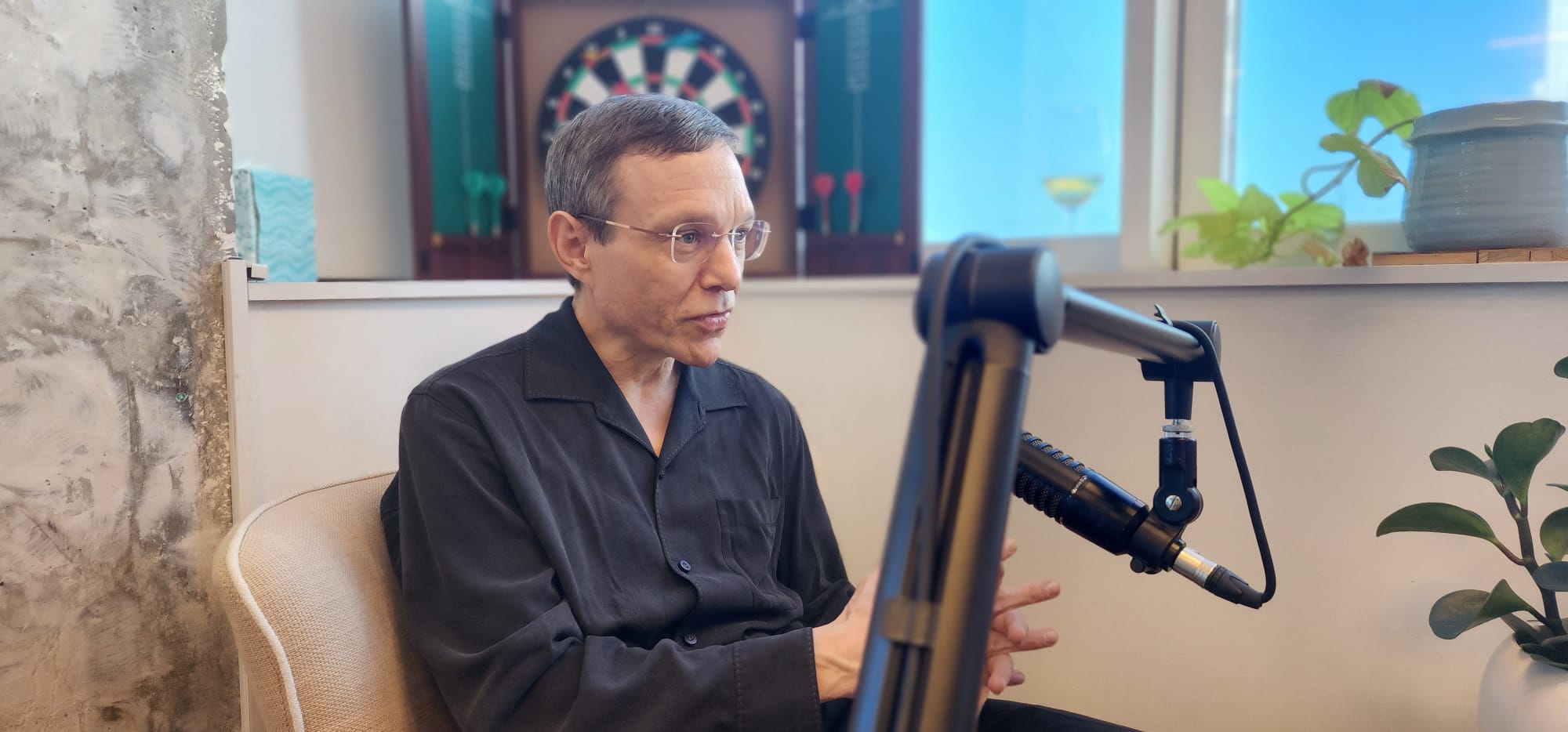
Renee Ghert-Zand
If an alien spacecraft landed in Prof. Avi Loeb’s backyard tomorrow, he would readily step on, leave his family behind and take off to discover the great beyond.
Obviously, he’d be giving up a lot, but it’s for an essential cause, he says: Humans need to explore the possibilities for human life beyond earth.
“We know the sun will burn up the surface of the earth within a billion years,” he says. “We won’t be able to stay here.”
Loeb, an Israeli-American astrophysicist at Harvard University, shared these thoughts recently in a podcast conversation with Dr. Tal Patalon, head of Kahn Sagol Maccabi (KSM), the Research and Innovation Center of Israel’s Maccabi Healthcare Services. Loeb was Patalon’s guest on an episode of KSM’s popular English-language podcast, “A Matter of Life and Death.”
Now in its third season (and first in English), the podcast features physician-researcher Patalon in wide-ranging conversations about life, the future and the human experience with leaders and innovative thinkers from a broad variety disciplines and fields of knowledge — from the former head of the Mossad to musicians and professors. Patalon elicits insights and showcases her multidisciplinary approach to her work at KSM, and she also has a way of getting at the core of her guests’ personalities and belief systems.
“These are open conversations, not interviews,” Patalon said. “It’s all about relationships and learning from these people. These are really special individuals who help broaden your perspective and serve as inspiration for innovation.”
KSM itself conducts various types of health research, helping researchers and entrepreneurs with its massive clinical and medical data as well as deep understanding of technology and artificial intelligence. KSM also operates the largest biobank in Israel, with over 900,000 biological samples, enabling partnerships with companies in genetic research and support for a range of Big Data projects.
Patalon’s podcast embodies the out-of-the-box thinking that guides KSM’s approach to research and innovation. Her recent conversation with Loeb covered the AI revolution, extending human longevity, and Loeb’s work at The Galileo Project for the Systematic Search for Evidence of Extraterrestrial Technological Artifacts.
Loeb leads the Galileo Project’s search for physical objects associated with extraterrestrial technological equipment. He and his team use sophisticated instruments to image and collect data on objects in the sky that the government and astronomers have deemed outliers. The goal is to determine whether they are natural phenomena or technological in origin and from other planets.
“I am looking for relics of [extraterrestrial] civilizations that have perhaps predated us and sent out gadgets and probes to explore space,” Loeb said. “They would have had enough to have filled up the solar system with a million probes. Tech gadgets can survive the harsh environments of space.”
Loeb and his team identified an interstellar meteorite that collided with Earth off Papua New Guinea in 2014. Based on the speed of the object, Loeb determined that it came from outside the solar system, and the Department of Defense supported his assertion.
“It exploded. We are planning an expedition to scoop the ocean floor to collect the fragments,” Loeb said. “We know it was tougher than iron, so we will examine the fragments to see if the object was natural or an artificial alloy that could be a fragment of a spacecraft.”

Avi Loeb, an Israeli-American astrophysicist at Harvard University, talks about artificial intelligence, extraterrestrial life and technology as the featured guest on a recent podcast episode of “A Matter of Life and Death.” (Courtesy of KSM via JTA.org)
Loeb told Patalon how his work has made him think that humans are not necessarily that smartest and most accomplished species in the universe, and that modesty is in order.
“We are no smarter than the mean of the universe, no matter what we have accomplished. We have nothing to brag about,” he said.
Patalon agreed: “We are arrogant. Our world is tiny and fragile and we are destroying it. We should cherish what we have.”
However, Patalon disagreed with Loeb when it comes to how far the AI revolution should go. Loeb believes we are close to the point where AI will take over many roles in human life.
“There will be sentient AI systems. They will converse among themselves and create their own communities. A new consciousness will emerge. Death will be like unplugging a computer from a wall, so in the future it will be illegal to do so,” he said.
From Patalon’s perspective as an active clinician specializing in family and emergency medicine, she is certain that AI will become integrated into the human body within five to 10 years. She expects to see augmented humans with constant glucose monitors and vitals-monitoring chips implanted under the skin.
“And 3-D printing of organs is developing fast,” she observed.
But unlike Loeb, Patalon believes that extending human longevity to an extreme degree is not the goal of AI. Rather, there is a consciousness above material reality, and a spirituality and soul beyond technology. She worries about the separation, depression and addiction associated with technology and wants to see more efforts put into helping people learn how to handle technological evolution. We can’t let AI run away with things and negate human consciousness and positive relationships, she said.
“A high-quality life means learning how to love unconditionally. That is the human future,” Patalon said. “Otherwise we are like animals.”
At the end of each episode of “A Matter of Life and Death,” Patalon asks her guest whether they think about death and what they would like their epitaph to be. Loeb thinks that people waste time and resources memorializing themselves by building monuments on Earth. Not particularly attached to his body, he said, he’d be be eager to download his consciousness to an avatar astronaut.
“I hope we will figure out how to live forever, but if I have to die, I would be happy for it to happen somewhere other than Earth,” he said. “On Mars there is no bureaucracy to suppress innovation.”
To listen to this and other podcast episodes, click here.




It’s becoming clear that with all the brain and consciousness theories out there, the proof will be in the pudding. By this I mean, can any particular theory be used to create a human adult level conscious machine. My bet is on the late Gerald Edelman’s Extended Theory of Neuronal Group Selection. The lead group in robotics based on this theory is the Neurorobotics Lab at UC at Irvine. Dr. Edelman distinguished between primary consciousness, which came first in evolution, and that humans share with other conscious animals, and higher order consciousness, which came to only humans with the acquisition of language. A machine with primary consciousness will probably have to come first.
What I find special about the TNGS is the Darwin series of automata created at the Neurosciences Institute by Dr. Edelman and his colleagues in the 1990’s and 2000’s. These machines perform in the real world, not in a restricted simulated world, and display convincing physical behavior indicative of higher psychological functions necessary for consciousness, such as perceptual categorization, memory, and learning. They are based on realistic models of the parts of the biological brain that the theory claims subserve these functions. The extended TNGS allows for the emergence of consciousness based only on further evolutionary development of the brain areas responsible for these functions, in a parsimonious way. No other research I’ve encountered is anywhere near as convincing.
I post because on almost every video and article about the brain and consciousness that I encounter, the attitude seems to be that we still know next to nothing about how the brain and consciousness work; that there’s lots of data but no unifying theory. I believe the extended TNGS is that theory. My motivation is to keep that theory in front of the public. And obviously, I consider it the route to a truly conscious machine, primary and higher-order.
My advice to people who want to create a conscious machine is to seriously ground themselves in the extended TNGS and the Darwin automata first, and proceed from there, by applying to Jeff Krichmar’s lab at UC Irvine, possibly.